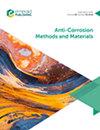The adsorption and inhibition efficiency of 2-amino-4-methoxy-6-methyl-1,3,5-triazine for corrosion of mild steel in hydrochloric acid solution
IF 2.6
4区 材料科学
Q2 METALLURGY & METALLURGICAL ENGINEERING
引用次数: 0
Abstract
Purpose This study aims to prevent mild steel (MS) against corrosion in 0.5 M HCl solution, 2-amino-4-methoxy-6-methyl-1,3,5-triazine was used. The effectiveness of the compound as a corrosion inhibitor was studied via electrochemical, surface and theoretical calculation techniques. Design/methodology/approach For concentrations ranging from 0.5 to 10.0 mM, almost similar polarization resistances were obtained from electrochemical impedance spectroscopy (EIS) and linear polarization resistance tests. It also investigated inhibitive activity of 2-amino-4-methoxy-6-methyl-1,3,5-triazine on the steel surface using scanning electron and atomic force microscope instruments. Langmuir adsorption is the best matched isotherm for the adsorption of the inhibitor to the steel surface. Findings EIS method was used to determine inhibition efficiency, which was determined to be 95.7% for 10.0 mM inhibitor containing acid solution. Density functional theory’s predictions for quantum chemistry agreed well with the other experimental results. Originality/value The methods used in this study are effective and applicable; the used organic inhibitor is 2-amino-4-methoxy-6-methyl-1,3,5-triazine; and protective effectiveness is important, which is crucial for the task of MS corrosion prevention.2-氨基-4-甲氧基-6-甲基-1,3,5-三嗪对低碳钢在盐酸溶液中腐蚀的吸附和抑制作用
目的采用2-氨基-4-甲氧基-6-甲基-1,3,5-三嗪防止低碳钢(MS)在0.5 M盐酸溶液中的腐蚀。通过电化学、表面和理论计算等方法研究了该化合物作为缓蚀剂的有效性。在0.5 ~ 10.0 mM的浓度范围内,电化学阻抗谱(EIS)和线性极化电阻测试获得了几乎相似的极化电阻。利用扫描电子显微镜和原子力显微镜研究了2-氨基-4-甲氧基-6-甲基-1,3,5-三嗪对钢表面的抑制活性。Langmuir吸附等温线是缓蚀剂在钢表面吸附的最佳匹配等温线。采用seis法测定缓蚀剂的缓蚀率,对含酸溶液的10.0 mM缓蚀剂的缓蚀率为95.7%。密度泛函理论对量子化学的预测与其他实验结果吻合得很好。原创性/价值本研究使用的方法是有效和适用的;所使用的有机抑制剂为2-氨基-4-甲氧基-6-甲基-1,3,5-三嗪;和防护效果是至关重要的,这对MS防腐任务至关重要。
本文章由计算机程序翻译,如有差异,请以英文原文为准。
求助全文
约1分钟内获得全文
求助全文
来源期刊

Anti-corrosion Methods and Materials
工程技术-冶金工程
CiteScore
2.80
自引率
16.70%
发文量
61
审稿时长
13.5 months
期刊介绍:
Anti-Corrosion Methods and Materials publishes a broad coverage of the materials and techniques employed in corrosion prevention. Coverage is essentially of a practical nature and designed to be of material benefit to those working in the field. Proven applications are covered together with company news and new product information. Anti-Corrosion Methods and Materials now also includes research articles that reflect the most interesting and strategically important research and development activities from around the world.
Every year, industry pays a massive and rising cost for its corrosion problems. Research and development into new materials, processes and initiatives to combat this loss is increasing, and new findings are constantly coming to light which can help to beat corrosion problems throughout industry. This journal uniquely focuses on these exciting developments to make essential reading for anyone aiming to regain profits lost through corrosion difficulties.
• New methods, materials and software
• New developments in research and industry
• Stainless steels
• Protection of structural steelwork
• Industry update, conference news, dates and events
• Environmental issues
• Health & safety, including EC regulations
• Corrosion monitoring and plant health assessment
• The latest equipment and processes
• Corrosion cost and corrosion risk management.
 求助内容:
求助内容: 应助结果提醒方式:
应助结果提醒方式:


